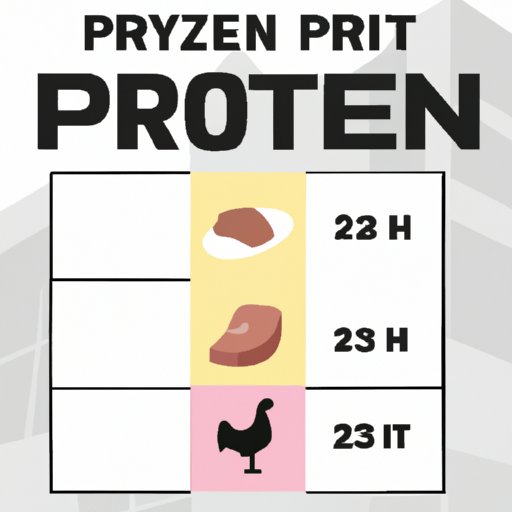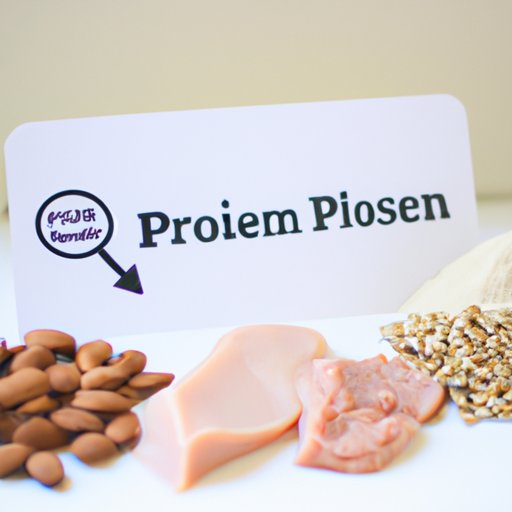Introduction
Protein is an essential nutrient that plays a vital role in our overall health and wellbeing. It’s found in a wide variety of foods including meat, fish, eggs, dairy products, legumes, nuts, and seeds. Protein helps build and repair tissues, produces enzymes and hormones, transports nutrients throughout the body, and provides energy. So it’s important to make sure we’re getting enough of it in our diets.

A Guide to Eating the Right Amount of Protein Per Day
Knowing how much protein you need per day can be confusing. We all have different dietary requirements depending on our age, sex, and activity level. But there are some general guidelines that can help you determine how much protein you should be eating each day.
How Much Protein Should You Eat Each Day?
The Recommended Daily Allowance (RDA) for protein is 0.8 grams per kilogram of body weight. This means if you weigh 60kg, you should aim to consume 48 grams of protein per day. However, this amount may not be enough for people who are physically active or trying to build muscle mass. For them, the recommended amount is 1.2-2.0 grams per kilogram of body weight.
Calculating Your Ideal Daily Protein Intake
To calculate your ideal daily protein intake, multiply your body weight in kilograms by 0.8 (for sedentary individuals) or 1.2-2.0 (for those who are physically active). For example, if you are a physically active individual weighing 70kg, your ideal daily protein intake would be between 84-140 grams per day.
The Benefits of Eating the Right Amount of Protein
Eating the right amount of protein has many benefits. Here are just a few:
Better Muscle Growth
One of the most important benefits of getting enough protein is improved muscle growth. Protein helps build and repair muscles, so consuming adequate amounts of it can lead to better muscle growth and strength. Eating the right amount of protein also helps to reduce muscle loss, which is especially important for older adults.
Improved Metabolism
Protein is essential for maintaining a healthy metabolism. Consuming the right amount of protein can help boost your metabolism, increase fat burning, and promote weight loss. It can also help keep your blood sugar levels stable and reduce hunger.
Reduced Risk of Disease
Getting enough protein in your diet can help reduce the risk of certain diseases. Studies have shown that consuming adequate amounts of protein can help lower cholesterol and triglyceride levels, reduce the risk of heart disease, and reduce the risk of type 2 diabetes.

Understanding Protein Needs for Optimal Health
In addition to knowing how much protein to eat per day, it’s important to understand factors that influence protein needs and the Recommended Dietary Allowances (RDA). Here’s what you need to know:
Factors That Influence Protein Intake
Your protein needs depend on several factors including your age, sex, activity level, and health status. For example, pregnant women, athletes, and those recovering from an injury or illness may require more protein than the average person. It’s also important to consider that some foods such as red meat, poultry, and fish contain higher amounts of protein than others.
Recommended Dietary Allowances (RDA)
The RDA for protein is 0.8 grams per kilogram of body weight. This means if you weigh 60kg, you should aim to consume 48 grams of protein per day. For those who are physically active or trying to build muscle mass, the recommended amount is 1.2-2.0 grams per kilogram of body weight.
Conclusion
Protein is an essential nutrient that plays an important role in our overall health and wellbeing. Knowing how much protein to eat per day can be confusing, but there are some general guidelines that can help you determine how much protein you should be eating each day. Eating the right amount of protein has many benefits including better muscle growth, improved metabolism, and reduced risk of disease. It’s also important to understand factors that influence protein needs and the Recommended Dietary Allowances (RDA).
(Note: Is this article not meeting your expectations? Do you have knowledge or insights to share? Unlock new opportunities and expand your reach by joining our authors team. Click Registration to join us and share your expertise with our readers.)
